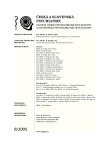-
Medical journals
- Career
Psychobiological Reactions on Stress and Trauma
Authors: P. Bob; J. Vymětal 2
Authors‘ workplace: Psychiatrická klinika 1. LF UK a VFN, Praha ; přednosta prof. MUDr. J. Raboch, DrSc. Ústav pro humanitní studia v lékařství 1. LF UK, Praha 1; přednosta prof. PhDr. J. Vymětal 2
Published in: Čes. a slov. Psychiat., 101, 2005, No. 8, pp. 425-432.
Category: Comprehensive Reports
Overview
Connection between psychic and somatic processes is according to tradition of renaissance and modern European thought understood as one-sided influence of somatic processes on the mind. Reverse movement of psychic influence on the somatic processes was until recently out of framework of psychological and neuroscientific research. Research in these fields mainly in the last fifteen years led to many findings about influence of human mind on somatic functions mainly the influence of trauma and stress on pathological functioning. Main processes which play a role are dissociation connected to disintegration of consciousness and alexithymia which leads to dysfunctions in experiencing and sensing emotions. These psychological defense reactions emerge as a consequence of traumatic stress and in certain cases as consequence of lasting stress without traumatic stimuli. Traumatic stress leads to endocrine and immune dysfunctions, epileptiform disturbances and also to alterations in gene expression. These modern psychological and neuroscientific findings have led to emerging of new discipline called neuropsychotherapy which is able to influence psychic or somatic health by psychotherapy inducing changes in human biological functions.
Key words:
trauma, stress, dissociation, alexithymia, neuropsychotherapy.
Labels
Addictology Paediatric psychiatry Psychiatry
Article was published inCzech and Slovak Psychiatry

2005 Issue 8
Most read in this issue- Psychobiological Reactions on Stress and Trauma
- Ability to Understand Non-verbal Communication by Psychiatric Inpatients
- Neuropsychiatric Symptomatology in Systemic Lupus Patients
- Profile of Cognitive Functions in Patients with Depression and Schiozphrenia
Login#ADS_BOTTOM_SCRIPTS#Forgotten passwordEnter the email address that you registered with. We will send you instructions on how to set a new password.
- Career

